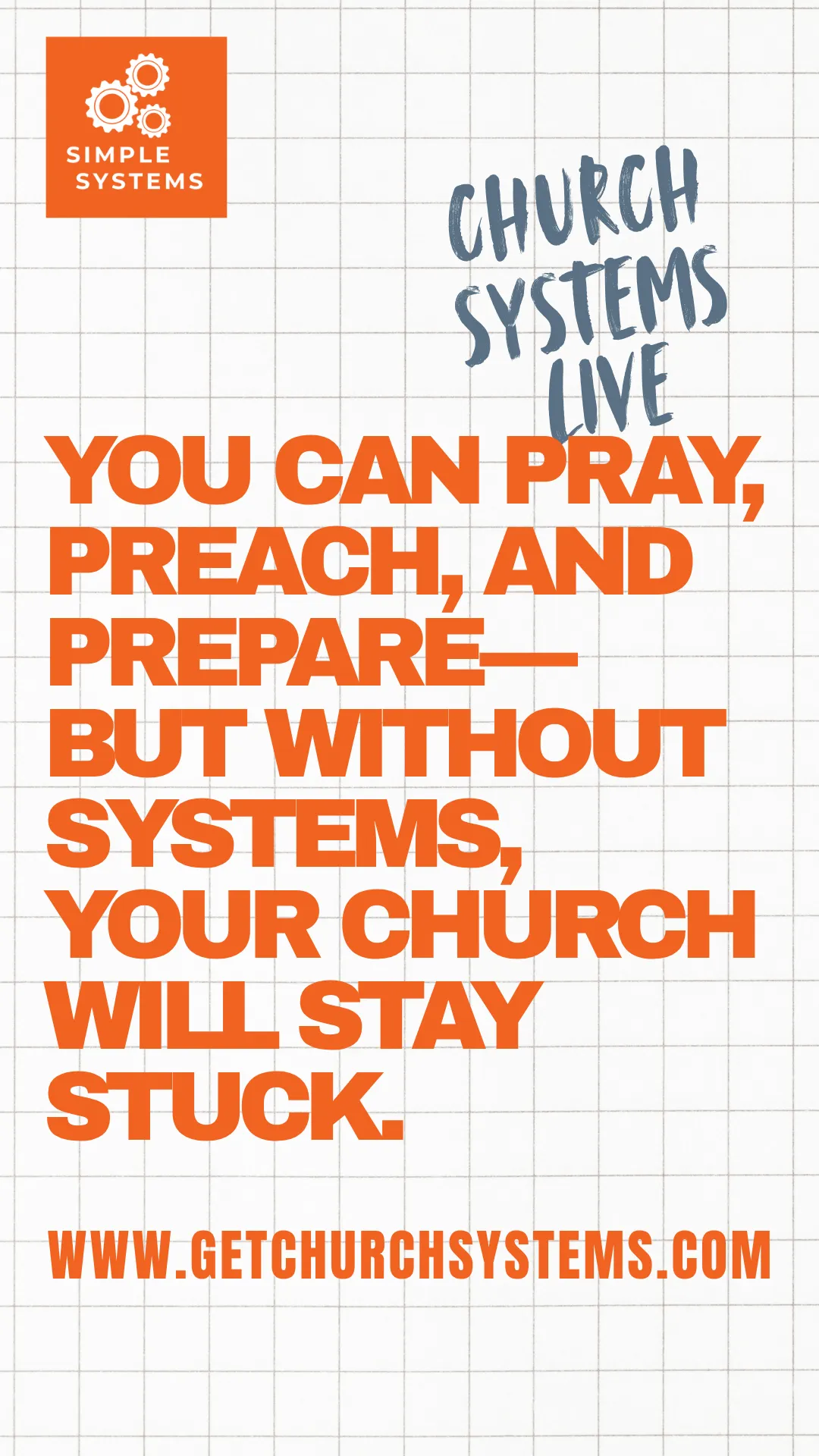
"Transform Your Church with Simple Systems and Cutting-Edge Technology"
Join the Church Systems Bootcamp - Empower Your Ministry, Impact Your Community!




Why Simple Systems Consulting?
Welcome to Simple Systems Consulting - Your Trusted Partner in Church Growth! At Simple Systems, we are dedicated to helping pastors achieve genuine and sustainable church growth. Our founder, Henry Tolbert, has collaborated with over 100 churches to build powerful systems that maximize impact without compromising on gimmicks.
After years of serving as a church leader in many different roles, I felt an overwhelming call to find a role that allowed me to serve pastors and church leaders everywhere. more specifically, I wanted to help churches see the value of spiritual growth through discipleship.
Over and over again, I would see churches pursue numerical and financial growth, without realizing that if people grew spiritually they could more easily help the church numerically and financially.
After just one year, our team has been able to see more than 2500 people start a discipleship journey through their local church. That's who we are. We're disciple-makers who want to help you and your team become better disciple-makers.



Introducing the Church Systems Bootcamp - Your Gateway to Effective Ministry
This comprehensive program equips pastors with time-tested systems for worship planning, assimilation, evangelism, giver development and more. With our bootcamp, you can grow your church authentically and achieve lasting impact!
Develop A Stronger Team To Carry More Responsibility
Turn Visitors Into Members More Consistently
Onboard New Members And Get Them Active Fast
Maximize Your Time So You Can Focus On What's Next
Protect The Church By Building Systems That Stay When People Leave
Save Money And Increase Revenue By Developing Generous Givers In The Church
WE HAVE WORKED WITH 100+ CHURCHES AND COUNTING:



Real Stories of Church Transformation
Hear Inspiring Stories of Church Transformation! Our bootcamp has empowered countless pastors to witness remarkable growth while staying true to their calling. Discover how church systems have revolutionized ministries and brought genuine impact to communities.
Copyright 2023 . All rights reserved
YOU WANT TO MAKE MORE DISCIPLES.
WE MAKE IT SIMPLE..

Small Call to Action Headline
Your Paragraph text goes Lorem ipsum dolor sit amet, consectetur adipisicing elit. Autem dolore, alias, numquam enim ab voluptate id quam harum ducimus cupiditate similique quisquam et deserunt, recusandae. here

Small Call to Action Headline
Your Paragraph text goes Lorem ipsum dolor sit amet, consectetur adipisicing elit. Autem dolore, alias, numquam enim ab voluptate id quam harum ducimus cupiditate similique quisquam et deserunt, recusandae. here

Small Call to Action Headline
Your Paragraph text goes Lorem ipsum dolor sit amet, consectetur adipisicing elit. Autem dolore, alias, numquam enim ab voluptate id quam harum ducimus cupiditate similique quisquam et deserunt, recusandae. here
YOU WANT TO MAKE MORE DISCIPLES.
WE HAVE THE SYSTEMS TO HELP YOU DO IT!
1. REACH & KEEP NEW PEOPLE
Begin with a strong focus to GATHER new people and get them engaged with the church.
2. BUILD & FIELD YOUR TEAMS
Shift focus to GROW the people you have with systems to build connection and commitment.
3. CATCH & RELEASE NEW LEADERS
Expand the vision to create space for new leaders to emerge and take the ministry to new spaces and new people for the Kingdom.
THE RESULTS SPEAK FOR THEMSELVES!

Belief Shapes Vision: 5 Lies Keeping Small Church Pastors Stuck
Belief Shapes Vision: 5 Lies Keeping Small Church Pastors Stuck
You can be preaching every week, loving your people, doing the best you know how…
…and still feel stuck.
Stuck at the same attendance.
Stuck at the same giving.
Stuck in the same patterns.
If you’re leading a church under 100, you probably know that feeling very well.
Most pastors assume the problem is:
“We’re too small.”
“We don’t have enough money.”
“We don’t have the right people.”
But most of the time, that’s not the real problem.
The real problem is the story you’re believing about what’s possible.
That’s what this blog is about: 5 lies small church pastors believe that quietly choke out vision, courage, and progress…and how to trade those lies for truth and action.
The Real Problem Isn’t Size. It’s the Story in Your Head.
Vision is the picture God shows you of the future He’s called you to build.
You’re standing at alpha.
He shows you omega.
And you and the Holy Spirit walk out everything in between.
But here’s the catch:
Belief shapes vision.
What you really believe about yourself, your church, and your God will limit what you can even see.
Post-COVID, the “board” changed.
It feels like you spent 20 years playing checkers and woke up in a chess tournament. Same squares. Completely different game.
If you don’t deal with the lies underneath, you’ll keep trying to lead 2025 with a 2010 mindset.
Let’s expose 5 of those lies.
Lie #1: “We’re Too Small to Make a Difference”
This one is everywhere.
What it does to you
When you believe “we’re too small to matter,” you start:
Walking into rooms like you don’t belong.
Shrinking your ideas before you even share them.
Killing vision before it has a chance to breathe.
You get a God-sized idea…and talk yourself out of it.
“The people won’t support it.”
“We don’t have the volunteers.”
“I’m not doing all that by myself.”
You do the enemy’s job for him.
What it does to your people
Your people can feel how you see yourself and your church.
You might think you’re hiding it, but you’re not.
If you see your church as “less than,” they will start to see themselves as second-class, too.
Second-class church.
Second-class gifts.
Second-class impact.
That is not how Heaven sees them.
“Whoever can be trusted with very little can also be trusted with much…” (Luke 16:10)
God isn’t embarrassed by your size.
He’s looking for faithfulness, not flash.
How to break the lie
Shift your focus:
From how many to how deeply.
Instead of obsessing over empty chairs:
Ask: How deeply are we discipling the people already here?
Measure life change, not just head count.
Build simple systems so that when God sends more, you’re ready.
This is why I talk so much about systems for small churches:
A system to follow up with guests
A system to disciple and develop leaders
A system to communicate clearly every week
You’re not too small to make a difference.
You’re too small to waste people’s lives by staying shallow.
Lie #2: “We Don’t Have Enough Money to Grow”
Money is real. Budgets are tight.
But this lie is sneaky.
What it does to you
When you believe this, you start making fear-driven decisions:
You filter every God idea through, “What do we have right now?”
You say no to opportunities you know He sent.
You never build momentum because bold moves scare you.
Fear grabs the mic where faith was supposed to be talking.
And you can’t get out of a rut with the same thinking that created it.
What it does to your people
When you stop taking faith-led, wise risks:
Your people lose confidence in the vision.
Giving dries up, not because they’re evil, but because nothing feels like it’s going anywhere.
People are far more generous when they sense:
“My church has a clear direction. My giving actually moves the mission.”
“Whoever can be trusted with very little can also be trusted with much…” (Luke 16:10 again)
God doesn’t ask you to be reckless.
But He also doesn’t fund fear.
How to break the lie
A few simple shifts:
Steward what you have
Clean books, clear budget, no mystery.
Your salary doesn’t eat the whole pie.
Invest in what actually moves the mission
Systems, discipleship, outreach, not random events.
Make one bold, prayer-through move in the next 90 days.
That might be:
Launching a focused outreach event
Bringing in help (like coaching or systems support)
Upgrading a key area that affects people every week (sound, kids, guest process)
God funds faithful, wise steps, not fear-based hiding.
If you want help putting your budget behind the right things, that’s exactly what we work through inside Church Systems in a Box, how to use what you have to build systems that actually help you grow -CSB_LINK
Lie #3: “Young People Don’t Want What We Have”
I hear this one constantly, especially in small and Black churches.
“They don’t want God.”
“They just want sports and TikTok.”
“Kids today don’t respect the church.”
Here’s the truth:
Most younger families aren’t running from God.
They’re looking for a church that is actually prepared for them.
What the lie does to you
When you believe young people don’t want what you have:
You stop investing in the next generation.
You cut the youth and kids ministry “until more kids come.”
You stop planning anything that speaks their language.
Then guess what?
They don’t come. And if they do, they don’t stay.
It becomes a self-fulfilling prophecy.
What does it do to your church
Every year, the average age ticks up.
Every funeral feels like a step closer to closing the doors.
Parents who do visit look around, see nothing for their kids, and quietly choose another church.
For most 30-45-year-old parents, this is the reality:
If you don’t have anything for my kids, you won’t have me for long.
How to break the lie
You don’t need a full-blown youth department on day one.
But you do need:
Something for kids (even if it’s 2–3 children)
Something for teens (even if it’s a small group, once or twice a month)
A plan that says: “We are thinking about and preparing for the next generation.”
Think simple:
One kid's volunteer who loves children
A short, age-appropriate Bible story and activity
A teen huddle during the sermon where they talk, ask questions, and yes—play some games
You’re not just serving the kids in the room.
You’re signaling to Heaven—and to the families who are coming, that you’re ready.
Lie #4: “Excellence Is Expensive”
Some pastors hear “excellence” and immediately think:
Expensive cameras
Pro lighting
Full band, full staff
Or they think excellence is relationally expensive:
“If I raise the standard, people will get mad and leave.”
What the lie does to you
When you believe excellence is too costly, you:
Settle for mediocrity
Stop holding people (or yourself) to any clear standard
Let everything slide because “at least they showed up.”
But God is not casual about how His work is handled.
“Let all things be done decently and in order.” (1 Cor 14:40)
What it does to your people
People can see disorganization a mile away.
They stop inviting their friends because they’re low-key embarrassed.
They disengage because nothing feels clear or thought-through.
Your culture drifts downward faster than you realize.
How to break the lie
Excellence isn’t about luxury. It’s about stewardship.
Practically, that means:
A simple Sunday run sheet so everyone knows what’s happening.
A quick rehearsal or huddle before service.
Clear communication: who’s doing what, when, and why.
You can run an excellent livestream with an iPhone and a plan.
You can run an excellent service with 30 people and a printed order.
Excellence is not about money.
It’s about mindset and systems.
Lie #5: “We Have to Do What the Big Churches Do”
This one might be the most exhausting.
You watch what the big churches are doing and feel like you have to copy:
Full Sunday + midweek + multiple ministries
Men’s, women’s, youth, singles, outreach, conferences…
All the things, all the time.
What the lie does to you
You end up:
Exhausted - trying to run a big-church calendar with a micro-church capacity
Confused - chasing trends instead of clarity
Stuck in comparison – listening to mentors whose world is miles away from yours
If you’re under 100, a mega church pastor can inspire you, but they may not be the best model for how to structure your next 12 months.
What it does to your people
Your people:
Get overloaded with activities
Burnout serving in 3-4 roles
Lose focus on what actually matters because the calendar is jammed
So the urgent pushes out the important.
The stuff that really moves the needle gets dropped.
How to break the lie
Go back to Jesus’ words:
“You are anxious and troubled about many things, but one thing is necessary.” (Luke 10:41 42 – paraphrased)
What’s the one thing for your church in this season?
You don’t have to do everything.
You have to do the right things really well.
A simple way to think about it:
4 anchor events a year, not 10 random ones
Q1 - Marriage/family night
Q2 - Kids/outreach (VBS, community day)
Q3 - Church anniversary (big invite push)
Q4 - Christmas or New Year’s Eve service
60 days of focused prep and promotion for each
Simplify your calendar so your people, and you, can breathe.
God didn’t call you to be an echo.
He called you to be a voice.
Your Next 90 Days: Trade Lies for a New Level of Leadership
You’re not stuck because:
Your church is too small
Your budget is too tight
Your city is too hard
You’re stuck because some lies have been running the show.
Here’s your 90-day challenge:
Name your lie.
Which one hit you the hardest?“We’re too small to make a difference.”
“We don’t have enough money to grow.”
“Young people don’t want what we have.”
“Excellence is expensive.”
“We have to do what the big churches do.”
Replace it with truth.
Write a simple, biblical sentence to fight it.
Example: “We are small, but we can go deep and God can trust us with more.”Build one simple system that matches that truth.
If your lie is “We’re too small to matter,” build a disciple-making rhythm for the 10–20 you have.
If your lie is “We don’t have money,” build a clear budget and choose one bold move.
If your lie is “Young people don’t want this,” launch a basic kids/teen environment and commit to it.
Run it as a 90-day sprint.
Don’t try to fix everything.
Just be faithful to one new system that lines up with the truth.
You don’t have to stay where you are.
But you also don’t have to kill yourself to grow.
You just need vision shaped by truth, and systems that match it.
Are You Ready for Help So You Don’t Have to Do This Alone?
If you’re tired of trying to figure this out by yourself, that’s exactly why we built our offers for small and micro churches:
Ready to stop the leaks in 90 days? Save your seat - WEBINAR_LINK
DIY pace ($997/year, 14-day refund, BNPL often ≈ $97/mo, subject to approval) - CSB_LINK
Done-With-You speed (90 days, $7,500, with plans like $2,750×3 or $1,450×6) - ACCEL_LINK
You don’t have to chase big.
Let’s get effective with what God has already put in your hands.












